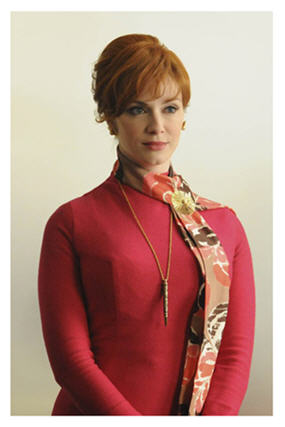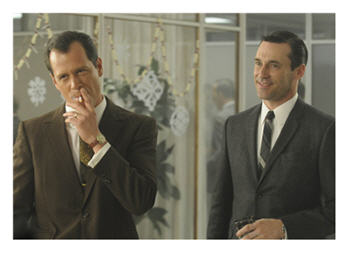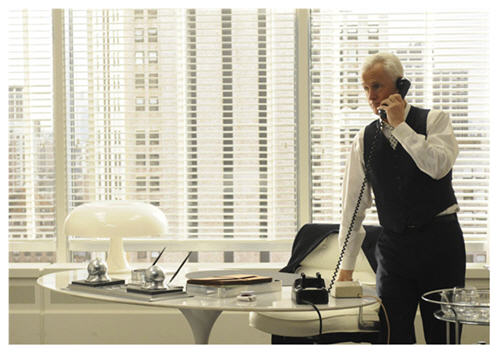“Christmas comes but once a year”
 For the sake of our hero, Don Draper – and for his daughter, Sally – we’re grateful that Christmas comes but once a year, and of course the New Year celebration as well. We’re reminded by the latest Mad Men episode that holidays are painful for those who are alone, or where the familiar terrain of family gatherings has been replaced by something starkly different.
For the sake of our hero, Don Draper – and for his daughter, Sally – we’re grateful that Christmas comes but once a year, and of course the New Year celebration as well. We’re reminded by the latest Mad Men episode that holidays are painful for those who are alone, or where the familiar terrain of family gatherings has been replaced by something starkly different.
It’s not only Don and Sally who are at a loss in their post-divorce landscape. Peggy, the forward-thinking secretary-turned-copywriter also finds herself wondering about the future. “I don’t want to be alone for New Years” she confides, and seems to settle for the presence of her current boyfriend – out of the bedroom and in – rather than find herself on her own.
Why we love Mad Men
It’s this kind of human contradiction – Peggy’s independence pitted against the pull of more traditional roles – that is one of the reasons we love Mad Men. Of course, there’s the glitz and glam of the sixties – the lavish sets, the attention to detail in costumes, the pleasure of mid-century design and art. But the behaviors seduce us – an abundance of alcohol (everywhere), the more carefree nature of sex (behind closed doors), the freedoms we sense in speaking one’s mind, even as we recognize the sexism, racism, and general insensitivity that runs rampant, stacked up next to our contemporary political correctness.
A thoughtful New York Times article on why we love Mad Men boils it down to a nostalgic desire for “fun” – an ability to live vicariously through this show while we remain constrained by the more personally and socially responsible “enlightenment” of the past few decades.
There’s merit to that position. Certainly, the lack of worry over cocktails (no concern over alcoholism), extramarital affairs (the only worry seems to be pregnancy), and more latitude (for the men) hook us with their surface simplicity relative to the hassles and pace of 21st century life. But we know there’s plenty below the surface, and much more to the admiration we have with this show.
Messy lives, great story
The New York Times goes on to describe the lives of our fictitious heroes as “messy,” and without question, they are. This is certainly part of the appeal. As we watch others screw up, we feel less guilty about our own failings. Witnessing struggle and secrets, we feel part of the mass of humanity that harbors ill will and yes, skeletons in the closets. And is there a character on this show without conflict or secrets?
Hardly. Don may have revealed his true identity to his wife (the result was divorce), but even in this episode we see his past plague him; he is asked in a consumer survey to comment on his father, and he excuses himself. We also see him still unable to keep it zipped, as he succumbs to the loneliness of the holidays and sleeps with his secretary. Of course he regrets it, and mishandles the aftermath, as we sense another complication brewing.
Then there’s Peggy, hiding her considerable sexual expertise from her current boyfriend who assumes her virginal status. Joan keeps the stiff upper lip around the new offices, though we presume her marital life is unhappy. Roger can’t be entirely satisfied with his much younger Wife Number 2; his interactions with Joan reveal more than sexual longing, but a desire for intimacy most likely missing in his marriage.
In these messy lives, we experience a relief valve. And kinship.
Light, dark, and new doors
This episode offers more of the series’ adept lighting to suggest mood. Don’s apartment is dingy and dark. The Draper household, now referred to as the “Francis” household, is also dimly lit, as is the scene picking out Christmas trees where Sally and former odd kid, Glen meet up. In fact, the only place that is brightly lit is the new office of Sterling Cooper Draper Pryce.
Telling – isn’t it? Virtually every scene in their new digs is light-filled, and the women are wearing vibrant, solid colors. Does that bode well for the new agency and the skills of their team?
 Naturally, we’re left vaguely concerned over the not-so-subtle foreshadowing: Lee Garner Junior, the slick executive of Lucky Strike, knows he’s the sole large account at the new agency – 69% of billings. He’s stringing along Roger Sterling, and humiliating him as well. We can anticipate trouble.
Naturally, we’re left vaguely concerned over the not-so-subtle foreshadowing: Lee Garner Junior, the slick executive of Lucky Strike, knows he’s the sole large account at the new agency – 69% of billings. He’s stringing along Roger Sterling, and humiliating him as well. We can anticipate trouble.
As for creepy kid Glen, he reminds us that divorce was profoundly painful for children in the 60s. Divorce is often traumatic for children, but there was little awareness of that fact 40 years ago, and we see Sally’s loneliness – and Glen’s – also a child of divorce. His strange vandalism of the Draper-Francis kitchen is unsettling to say the least. And we worry for Sally, who seems increasingly neglected, but hangs on to the lanyard he’s made – and left – to let her know that he did the damage as some twisted act of courtship.
Pace, style, clarity
For those who were uneasy after the season premiere and it’s frantic pace, we’ve returned to a slower more familiar format in Episode 2. We see faces we recognize, as they fall back into old patterns. We know where we are, though not quite what to expect.
As for the style we’ve come to expect, might those be Eero Saarinen’s red tulip chairs I thought I caught a glimpse of? And is that a 1960 Saarinen laminate table in Roger’s office? If so, we have Roger’s young wife to thank for bringing lighter mid-century modern into the new environment.
This is precisely what we love about Mad Men. Along with lines like this one, spoken by Dr. Faye Miller, a new character and potential love interest for Don.
This business is about helping people sort out their deepest conflict. . . It’s all about what I want, versus what is expected of me.
What we want and expect is more of these characters, these conflicts, and their stories that illuminate our own.
Images courtesy AMCTV.com; Photos Michael Yarish/AMC
Read more Mad Men musings and recaps.
© D A Wolf

All I know of Mad Men is what I read vicariously in magazines. But it reminds me of the movie Far From Heaven. There’s both a melancholy and a vibrancy of the time period the belies the cultural and social turmoil. I think that’s why we’re all so fascinated, at least, that’s why I am.
Far From Heaven. Terrific movie. Melancholy, vibrancy, social turmoil. Well said.
I’ve never watched “Mad Men.” I think it’s because I know how much I’d like it. I know I’d set aside everything to sit in front of the boob tube at the exact moment the show is on. This will sound insane but I love watching “live” TV and not recording it because I want to witness the events first hand. Anyway I digress, the other reason I’d be hooked is I love literature (and TV shows, movies, art) that entertain and inform us like “Mad Men”. “Have you thought about living this way?” “This is how I got here. What about you?” Thanks for sharing. I just may break down and start watching the show.